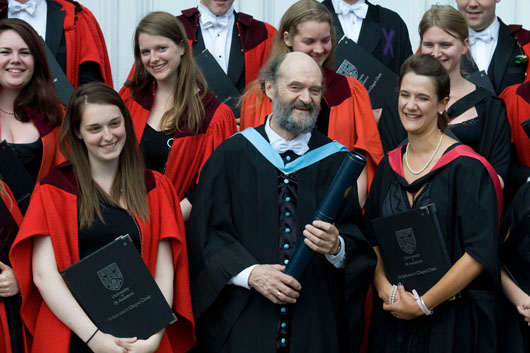Laureation address – Dr Arvo Pärt

Dr Arvo Pärt
Honorary Degree of Doctor of Music
Laureation by Dr Michael Downes
Music Centre
Friday 25 June 2010
Chancellor, it is my privilege to present Arvo Pärt for the Degree of Doctor of Music, honoris causa.
Arvo Pärt’s career is one of the most extraordinary of any composer living today. He dealt in early life with political pressures that silenced many of his contemporaries, going on to achieve mastery in not one but several musical styles. The interest and originality of his musical thought is recognised by professional performers, critics and musicologists alike, as the number of concerts and festivals, books and conferences devoted to his music throughout the world clearly demonstrates. But his music has also achieved a wider popularity rare among serious contemporary composers – partly due to its use in films ranging from Bertolucci’s Little Buddha to Michael Moore’s Fahrenheit 9/11, but much more importantly, because it so richly satisfies the basic human need for music to provide spiritual comfort in times of personal and collective stress. In the words of Alex Ross, influential music critic of The New Yorker, ‘he has put his finger on something that is almost impossible to put into words – something to do with the power of music to obliterate the rigidities of space and time. One after the other, his chords silence the noise of the self, binding the mind to an eternal present.’
Arvo Pärt’s journeys to international eminence, and to the characteristic purity of style that we heard in Fratres, have not been straightforward. He grew up in Estonia at a time when the restrictions placed by Soviet authorities over artistic life made access to avant-garde music very limited. Undaunted by this, he studied the serial techniques of Schoenberg and Webern from the few scores and textbooks that had found their way into the Soviet Union, and courted official disapproval by using them in early works such as Nekrolog and Perpetuum mobile. With the restless energy that characterised his early career, however, he quickly moved away from the austerity of orthodox serialism towards a more eclectic collage technique which found expression in works such as Credo, composed in 1968, in which the tonal style of Bach’s Well-Tempered Clavier confronts modernist dissonance, and ultimately emerges victorious. But whereas some of his contemporaries deploy multiple styles in the spirit of a playful, even flippant postmodernism, for Pärt the exercise is conducted with moral seriousness, as a means of expressing his deeply felt religious beliefs.
With hindsight, Credo can be seen as the culmination of the first phase of Pärt’s career, which was succeeded by a dramatic and unexpected change of direction. From his studies of early music and of Gregorian chant emerged the radical purification of style that we experienced in Fratres, and that we hear also in Cantus in Memoriam Benjamin Britten, which is being performed by the Scottish Chamber Orchestra, the University’s Orchestra in Residence, in Holy Trinity Church a week today. Pärt has explained his new approach by comparing it to the sounding of bells: ‘I have discovered that it is enough when a single note is beautifully played. This one note, or a silent beat, or a moment of silence, comforts me. I work with very few elements – with one voice, two voices. The three notes of a triad are like bells and that is why I call it tintinnabulation.’ But of course the restriction of the harmonic language to a small number of consonant chords would not alone guarantee musical rewards: this is why it is misleading to describe Arvo Pärt’s music as ‘minimalist’. The sense of movement, of harmonic progression, is equally important; we heard in Fratres a mysterious but profound equilibrium, between consonant triads and satisfying progressions, between stability and flux.
This same equilibrium has characterised Arvo Pärt’s life. Enforced emigration has counterpointed the constancy of his humanitarian convictions and religious beliefs, whose expression became so difficult in his native Estonia by 1980 that Pärt and his family decided to leave. Initially intending to make for Israel, they settled first in Vienna and ultimately in Berlin. Since living in Western Europe, Arvo Pärt and his music have become steadily better known throughout the world, and particularly in the United Kingdom, for whose musicians he has expressed an especial warmth: Benjamin Britten is among the composers who has influenced him most profoundly, and the second piece we heard, Bogoróditse Djévo, was written for the Choir of King’s College, Cambridge – I was present at its first performance on Christmas Eve, 1990. It is a privilege for this University to be able to return the compliment by awarding this degree, which stems from the deep appreciation that many members of the academic community have expressed for Arvo Pärt’s work.
Chancellor, in recognition of his major contribution to the art of music, I invite you to confer on Arvo Pärt the Degree of Doctor of Music, honoris causa.
Category Awards